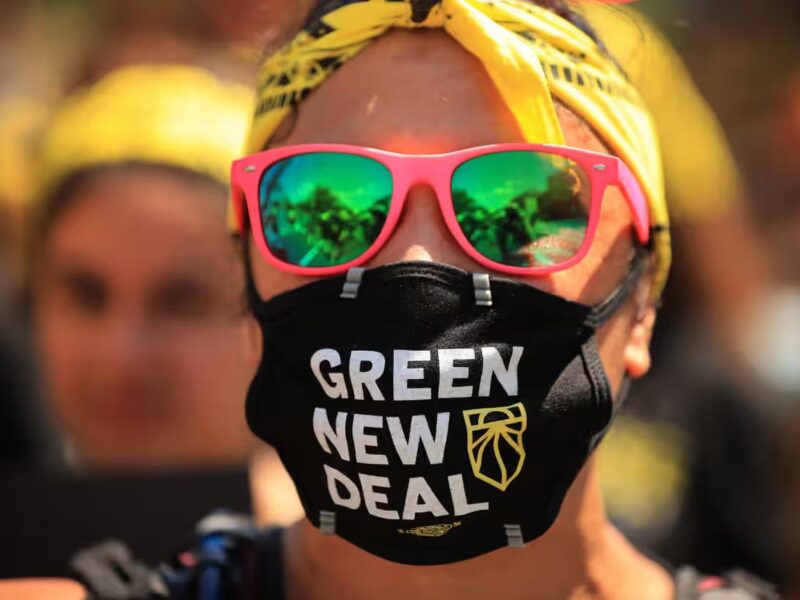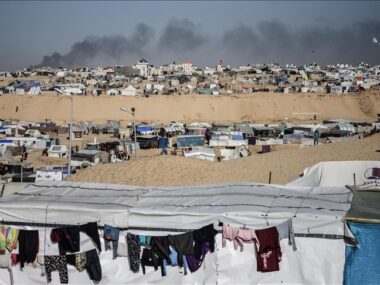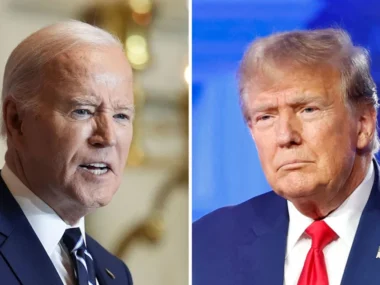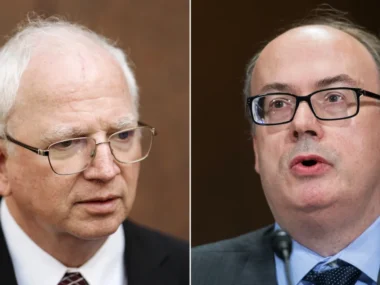Exclusive: a multistate tour aimed at pressuring Biden on climate action prior to the 2024 election will begin on Sunday in Michigan.
Following the much-lauded Inflation Reduction Act’s passing a year ago, a group of activists and lawmakers is resuming the national campaign for a Green New Deal.
According to John Paul Mejia, national spokesperson for the youth-led climate justice organization Sunrise Movement, one of the organizations presenting the tour, “the Inflation Reduction Act was the largest climate investment in US history.” “However, by winning much larger things, we should try to make [it] the smallest for the next ten years.”
The tour, which begins this month in Michigan, will include local advocates in addition to Green New Deal champions Senator Ed Markey of Massachusetts and Representatives Ilhan Omar, Jamaal Bowman, Cori Bush, and Summer Lee. The tour’s goal is to demonstrate the broad support for even bolder federal climate action. Leading the charge will be the Green New Deal Network, an alliance of progressive environmental groups like the Climate Justice Alliance, People’s Action, and Greenpeace, as well as left-leaning political parties Working Families and People’s Action for Social Justice.
Advocates are urging Congress to enact a number of ideas and for the administration to take more aggressive action.
“We can make historic investments that transform our communities by repairing damage caused by the fossil fuel-driven climate crisis and providing every person with the resources they need to thrive with our Green New Deals for public schools, housing, cities, and more,” Representative Bowman stated.
Aiming to quickly and fairly decarbonize the US economy while creating millions of jobs, the Green New Deal dominated the left political landscape in the US during Donald Trump’s administration. In 2018, the Sunrise Movement staged sit-ins on Capitol Hill to demand its implementation. A few months later, Representative Alexandria Ocasio-Cortez of New York and Senator Markey presented an official resolution that elaborated on the idea.
The goal was broad and ambitious, based on the theory that addressing the climate issue could require a more equitable reconstruction of US society, giving priority to those communities most impacted by pollution, climate disasters, and inequality. It stood in stark contrast to earlier national decarbonization initiatives, like the abortive 2009 Waxman-Markey cap-and-trade scheme for pollution that warms the earth.
Referring to the 2006 documentary on the climate issue by the former US vice president Al Gore, Kaniela Ing, national director of the Green New Deal Network and a former legislator from Hawaii, said, “During that ‘Inconvenient Truth’ era, climate advocacy was very technocratic in some ways.” “However, the Green New Deal focused on connecting these disparate issues—better infrastructure, schools, and the climate—into things that people genuinely desired.”
Advocates of the Green New Deal concentrated on pressuring Joe Biden to enact similarly ambitious climate policies once he was elected president in 2020. The campaign is largely recognized for having contributed to the inclusion of a ground-breaking $369 billion for climate and renewable energy in the Inflation Reduction Act, which was formerly known as Build Back Better.
“We’ve been successful in elevating climate at the top of the political agenda since we introduced the Green New Deal resolution in 2019,” stated Markey. “We stuck to our guns on ‘no climate, no deal’ during the Build Back Better negotiations, which led to the historic victory of the Inflation Reduction Act movement.”
According to Markey, the Green New Deal’s Inflation Reduction Act “represented a major down payment.” However, the policies differ significantly. Proponents of the Green New Deal pointed out that it did little to reduce the use of coal, oil, and gas that heats the world and that it contained favors for the fossil fuel industry, such as requiring drilling and pipeline agreements. Many also bemoaned its feeble efforts to safeguard working conditions. According to Sophia Cheng, the director of People’s Action’s climate justice campaign, a progressive advocacy and political non-profit, it also gave less attention to enhancing affordable housing that is robust to climate change and public transportation.
“We seek more all-encompassing climate solutions that yield these advantages for the communities on the front lines,” she declared.
Furthermore, compared to what many progressives would have preferred, the Inflation Reduction Act placed a greater emphasis on private company incentives.
“The Green New Deal was clearly influenced by the Inflation Reduction Act, but it also sort of followed the easy route by giving corporations cash infusions in the hopes that they would alter their behavior,” Ing said. “We want to see greater emphasis placed on strengthening public institutions in order to increase our democratic control.”
A more robust climate program, according to Ing, would help Biden win over young voters who are disenchanted with his previous pro-fossil fuel policies, such approving the Willow drilling project in Alaska this year.
Despite being a federal policy plan, the new tour will try to highlight the potential effects of the Green New Deal on municipal and state governments.
“The goal is for individuals to manage their own resources at the hyperlocal level and for those federal investments to support them in doing so,” Ing stated.
There have been new elected backers of the Green New Deal idea since the resolution was first introduced in 2019.
“Western Pennsylvania, which was once a hotbed of fossil fuels, sent a Green New Deal politician to Congress, knowing I’ll fight for worker power and good union jobs, as well as for our children’s health,” declared Lee, the newly elected representative from Pennsylvania.
On November 5, Dearborn, Michigan, will be the first stop.
“Nearly a decade after the Flint water crisis, frontline and Bipoc communities in Michigan are still disproportionately burdened by continuing water and air pollution, hazardous waste from fossil fuel facilities and inadequate energy access,” said Mikal Goodman, the campaign manager at Michigan Alliance for Justice in Climate, whose group will co-host the event. “We will not allow President Biden’s climate campaign to continue as a done deal while children are unable to breathe on the school playground and people in our communities are dying from pollution.”
Additional rallies are planned before the year ends in Pennsylvania, Iowa, Missouri, California, Illinois, Minnesota, and Massachusetts, according to the organizers. These states were picked because they have significant populations of Green New Deal advocates and a track record of promoting and enacting progressive laws.
“We’re just getting started,” Markey declared, “and we’re taking the road to cities across the country with one clear message.”











